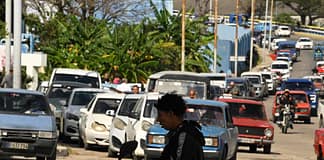
Despite agreeing to lower intra-regional roaming charges and fees, Caricom heads of government and telecom providers believe more needs to be done to improve service delivery.
So far, on Wednesday, Caricom heads of government joined with telecommunications providers, Flow and Digicel, at the signing of the Declaration of St George’s Towards the Reduction of Intra-Caricom Roaming Charges in the capital of Grenada.
Dubbed as a historic agreement, the declaration will result in the decrease in charges by as much as 70 per cent and will allow customers to enjoy “seamless mobile (cellular) services, including voice, SMS text and data”.
According to Kurleigh Prescod, vice-president — South Caribbean, Cable & Wireless Communications, “…we have taken this first transformational step to provide our valued Caricom customers with significantly reduced roaming packages across the region which deliver simple, consistent and transparent rates and overall reduction in customers’ charges, and eliminate the shock of receiving exorbitant bills”.
Notwithstanding the reduced charges, prime minister of Grenada Dr Keith Mitchell and his Bajan counterpart, Mia Mottley, both highlighted that Caricom leaders were committed to the complete elimination of roaming charges altogether.
“As historic as today’s signing is, we still have some critical milestones ahead of us. Ideally, Caribbean leaders want to see the full elimination of roaming charges within the Caribbean Community, and we will continue to push for this in the interest of our Caribbean people,” Dr Mitchell stated.
In the same vein, Prime Minister Mottley, who joined virtually from Barbados, said despite the gains achieved in the declaration, “we are short of our destination to eliminate roaming completely.
“Data bridges are absolutely critical and more so, as a result of the pandemic, we need to keep connectivity going. Data, information and connectivity must be cheap, must be available, must be fast,” she continued.

The Barbados prime minister further asserted that since Caricom achieved the signing of the agreements with Digicel Group and CWC as a singular organisation within pursuit of a “single market”, the body needs to also move to have a single ICT regulatory framework within the economic and trade bloc.
In signing the Declaration of St George’s, both Digicel Group and CWC have committed to advancing the implementation of the fundamental elements of the Vision and Roadmap for the Caricom Single ICT space.
Additionally, they agreed to establish harmonised regulatory environments in all Caricom member states; improving the overall customer experience by promoting greater regional connectivity; improving the ease of doing business in the telecoms and ICT sectors; and developing policies that encourage investments and lessen the financial burden on operators.
While underscoring CWC’s commitment to the declaration, Prescod noted that Caricom heads of government also had a role to play.
“We take this opportunity to support a call for continued dialogue among stakeholders to move this agenda forward — in particular, a forum where operators can collaborate with governments and regulators on current and future technologies, as any framework that we adopt must be future-proofed for the changes associated with the industry,” he stated.
In particular, the CWC VP called on Caribbean governments “to re-examine the level of license fees and universal service contributions, and duties and taxes on network equipment and infrastructure, to allow us to pass on further reductions to our valuable mutual subscribers and nationals”.
Prescod pointed out that in addition, with less demand for landline telephone services across the region and “the steep license and regulatory fees we pay”, the telecoms providers were now facing “significant competition from over-the-top (OTT) providers who leverage the investments … and charge to deliver, many times, the same content that we do use in our networks without contributing a single cent to have our taxation regulatory frameworks”.
This, he said, results in the erosion of taxes governments collect to reinvest in citizens while putting further strain on employment.
“Note, we are not asking for protectionism. All we ask for is parity and for the cost of regulation to be spread evenly across the providers of services to our communities,” Prescod emphasised.
To this end, he implored all parties to the declaration to explore more public-private partnerships that are designed to improve the lives of Caricom citizens.
Agreeing with his industry colleague, Digicel Group Government Relations Director Kieran Mulvey commented: “This declaration recognises the joint opportunities and challenges we face in advancing the goal and desire of us to collectively remove any impediments towards achieving a liberlaised market, and ensuring that all who avail of it contribute to the cost, most notably the OTTs like Facebook and WhatsApp.”
The roll-out of reduced roaming costs will be preceded by a period of public awareness campaigns and the streamlining and the implantation of technical changes.
Advertise with the mоѕt vіѕіtеd nеwѕ ѕіtе іn Antigua!
We offer fully customizable and flexible digital marketing packages.
Contact us at [email protected]















